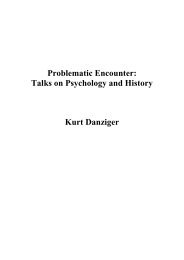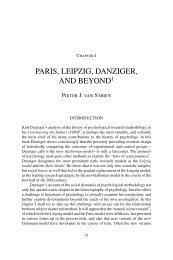The positivist repudiation of Wundt - Kurt Danziger
The positivist repudiation of Wundt - Kurt Danziger
The positivist repudiation of Wundt - Kurt Danziger
You also want an ePaper? Increase the reach of your titles
YUMPU automatically turns print PDFs into web optimized ePapers that Google loves.
THE POSITIVIST REPUDIATION OF WUNDT 209<br />
As soon as he could spare the time, <strong>Wundt</strong> wrote his own introductory text whose title is<br />
identical to KUlpe’s. This volume appeared three years later, in 1896. Kiilpe had left<br />
Leipzig for Wiirzburg in 1894. In that year <strong>Wundt</strong> published, in the Philosophische Stu-<br />
dien (vol. lo), a lengthy monograph in which he attempted to clarify his key concept <strong>of</strong><br />
“psychic causality” and to differentiate his position from that adopted by some <strong>of</strong> the<br />
younger generation <strong>of</strong> psychologists like Hugo Miinsterberg. In 1895 Kiilpe published<br />
his Einleitung in die Philosophie in which he presented a much more explicit statement <strong>of</strong><br />
his views on the nature <strong>of</strong> psychological science. <strong>The</strong> break was now complete. In the<br />
following year <strong>Wundt</strong> attacked Kiilpe’s position in an important paper entitled “<strong>The</strong><br />
Definition <strong>of</strong> Psychology.” l2<br />
In his introductory text <strong>of</strong> 1893 Kiilpe had been very careful to avoid explicit<br />
criticism <strong>of</strong> <strong>Wundt</strong>. This is hardly surprising in view <strong>of</strong> the dependence <strong>of</strong> Kiilpe’s career<br />
on <strong>Wundt</strong>’s goodwill at that point. Beyond that, it is very likely that genuine feelings <strong>of</strong><br />
respect and loyalty which had been built up in a typically paternalistic relationship over a<br />
number <strong>of</strong> years strongly inhibited the expression <strong>of</strong> direct criticism on Kiilpe’s part. <strong>The</strong><br />
book clearly deviates from <strong>Wundt</strong>’s position on some fundamental issues, but this fact is<br />
glimpsed explicitly only at the very end when <strong>Wundt</strong>’s doctrine <strong>of</strong> apperception is openly<br />
questioned. However, all the respectful references to <strong>Wundt</strong> that characterize various<br />
parts <strong>of</strong> the text cannot hide the fact that the master’s position is being subtly under-<br />
mined.<br />
<strong>The</strong> critical departure from <strong>Wundt</strong>ian doctrine occurs at the very beginning <strong>of</strong><br />
Kiilpe’s book, where a discussion <strong>of</strong> the task <strong>of</strong> psychological investigation sets the stage<br />
for the whole enterprise. In common with <strong>Wundt</strong>, Kiilpe rejects the definition <strong>of</strong> psy-<br />
chology in terms <strong>of</strong> a special subject matter. Like all sciences, psychology must start with<br />
the “facts <strong>of</strong> experience,’I but what distinguishes it is that it studies these facts in their<br />
dependency on experiencing individuals. However, this concept <strong>of</strong> an experiencing in-<br />
dividual is ambiguous, as Kiilpe immediately notes. We could take it to mean “the psy-<br />
chical individual,” a creature <strong>of</strong> subjective processes and capacities, like feeling, atten-<br />
tion, imagination, and so forth, or we could use it in the sense <strong>of</strong> a “corporeal in-<br />
dividual,” a biological organism, the seat <strong>of</strong> physiological processes. KUlpe now takes the<br />
critical step <strong>of</strong> rejecting unequivocally the “psychical individual” as an explanatory prin-<br />
ciple for scientific psychology and opts instead for the “corporeal individual.” This step<br />
is necessary for psychology to become what Kiilpe and his contemporaries wanted it to<br />
become - a natural science: “<strong>The</strong> objects <strong>of</strong> psychological enquiry would never present<br />
the advantages <strong>of</strong> measurability and unequivocalness, possessed in so high a degree by<br />
the objects investigated by natural science, if they could be brought into relation only<br />
with the psychical individual.” l3<br />
<strong>The</strong> rejection <strong>of</strong> the “psychical individual” as a basis for explanation in psychology<br />
is <strong>of</strong> course equivalent to a rejection <strong>of</strong> the <strong>Wundt</strong>ian notion <strong>of</strong> psychic causality. Psychic<br />
processes cannot be explained in terms <strong>of</strong> their dependence on other psychic processes,<br />
because there is no necessity in their interconnection: “Idea is not dependent upon emo-<br />
tion, nor emotion upon idea; a change in one is not necessarily followed by a definite<br />
change in the other. And ideas are not dependent solely upon one another; they come and<br />
go in our inner experience very much at random; their interconnections are for the most<br />
part not due to mutual influence, but obviously follow a law imposed upon them from<br />
without.” l4 This “without” is the “corporeal individual,” the living, physiological<br />
system; there are no “psychic causes.” It follows from this that, apart from the necessary<br />
analysis <strong>of</strong> complex phenomena into their elements, the only remaining task <strong>of</strong> psy-





